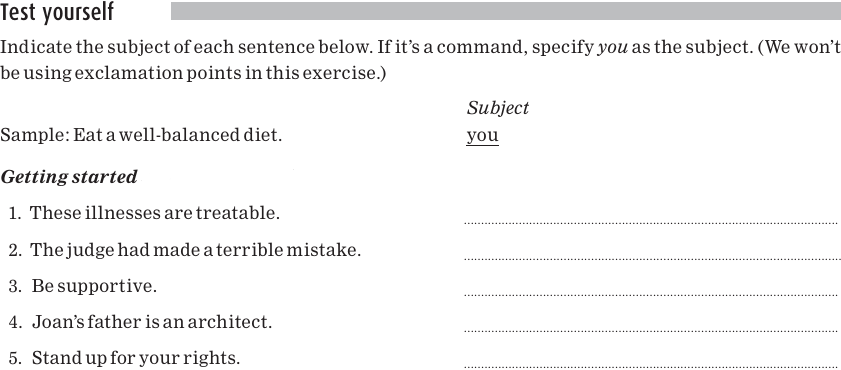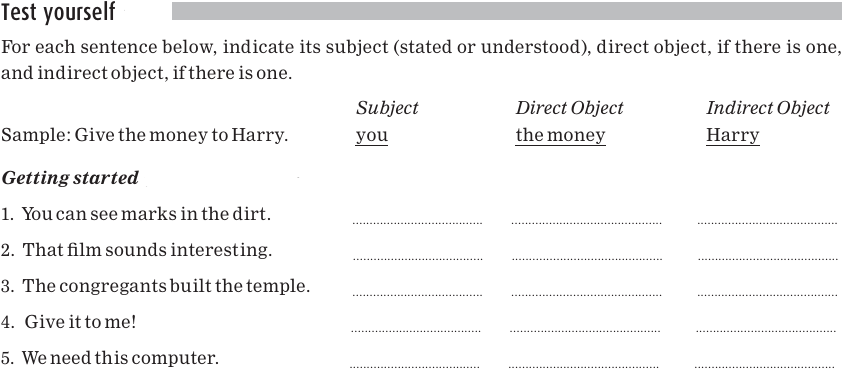

Grammar


Tenses


Present

Present Simple

Present Continuous

Present Perfect

Present Perfect Continuous


Past

Past Simple

Past Continuous

Past Perfect

Past Perfect Continuous


Future

Future Simple

Future Continuous

Future Perfect

Future Perfect Continuous


Parts Of Speech


Nouns

Countable and uncountable nouns

Verbal nouns

Singular and Plural nouns

Proper nouns

Nouns gender

Nouns definition

Concrete nouns

Abstract nouns

Common nouns

Collective nouns

Definition Of Nouns

Animate and Inanimate nouns

Nouns


Verbs

Stative and dynamic verbs

Finite and nonfinite verbs

To be verbs

Transitive and intransitive verbs

Auxiliary verbs

Modal verbs

Regular and irregular verbs

Action verbs

Verbs


Adverbs

Relative adverbs

Interrogative adverbs

Adverbs of time

Adverbs of place

Adverbs of reason

Adverbs of quantity

Adverbs of manner

Adverbs of frequency

Adverbs of affirmation

Adverbs


Adjectives

Quantitative adjective

Proper adjective

Possessive adjective

Numeral adjective

Interrogative adjective

Distributive adjective

Descriptive adjective

Demonstrative adjective


Pronouns

Subject pronoun

Relative pronoun

Reflexive pronoun

Reciprocal pronoun

Possessive pronoun

Personal pronoun

Interrogative pronoun

Indefinite pronoun

Emphatic pronoun

Distributive pronoun

Demonstrative pronoun

Pronouns


Pre Position


Preposition by function

Time preposition

Reason preposition

Possession preposition

Place preposition

Phrases preposition

Origin preposition

Measure preposition

Direction preposition

Contrast preposition

Agent preposition


Preposition by construction

Simple preposition

Phrase preposition

Double preposition

Compound preposition

prepositions


Conjunctions

Subordinating conjunction

Correlative conjunction

Coordinating conjunction

Conjunctive adverbs

conjunctions


Interjections

Express calling interjection

Phrases

Sentences


Grammar Rules

Passive and Active

Preference

Requests and offers

wishes

Be used to

Some and any

Could have done

Describing people

Giving advices

Possession

Comparative and superlative

Giving Reason

Making Suggestions

Apologizing

Forming questions

Since and for

Directions

Obligation

Adverbials

invitation

Articles

Imaginary condition

Zero conditional

First conditional

Second conditional

Third conditional

Reported speech

Demonstratives

Determiners


Linguistics

Phonetics

Phonology

Linguistics fields

Syntax

Morphology

Semantics

pragmatics

History

Writing

Grammar

Phonetics and Phonology

Semiotics


Reading Comprehension

Elementary

Intermediate

Advanced


Teaching Methods

Teaching Strategies

Assessment
Implied subjects: commands
المؤلف:
EVELYNP.ALTENBERG & ROBERTM.VAGO
المصدر:
English Grammar Understanding the basics
الجزء والصفحة:
P186-C13
2025-11-14
342
Implied subjects: commands
1.Open that book right now!
2. Don’t even think about crossing the street here!
3. Please be careful.
We all recognize a command when we hear one. We have seen that all sentences have a subject, but where is the subject of these commands? Speakers of English readily agree that these sentences do, in fact, have a subject. The subject, though not stated, is understood or implied to be you. Thus, when someone says ‘‘Wash the dishes!’’ you know they’re talking to you. Commands are also called imperative sentences.
In writing, command sentences often end with an exclamation point(!).
Quick tip
The subject of commands is an understood or implied you.

Answers

To enhance your understanding
There are a number of ways to prove what you, as a speaker of English, intuitively know: that you is the implicit subject of command sentences. We present one of these arguments here.
Take a look at the following sentences:
4. I held my breath.
5. You held your breath.
6. He held his breath.
7. She held her breath.
While these sentences are grammatical, the following sentences are not:
8a. *I held your breath.
8b. *I held his breath.
8c. *I held their breath.
9a. *You held my breath.
9b. *You held his breath.
9c. *You held their breath.
Can you explain why these sentences are ungrammatical? Clearly, a person cannot hold someone else’s breath. Thus, the two underlined pronouns must refer to the same person. If they don’t, the sentence is not grammatical, as in 8 and 9 above.
Now what about commands which contain this same expression? Look at the following grammatical and ungrammatical commands:
10. Hold your breath!
11. *Hold my breath!
12. *Hold his breath!
13. *Hold their breath!
In fact, the only pronoun allowed in the command context Hold ______ breath Is your. Since we know that your must refer to the same person as the subject, it follows that the subject in the command must be you. That is, even though the you is not actually stated, we treat a command as though the subject were you.

Answers

 الاكثر قراءة في Grammar
الاكثر قراءة في Grammar
 اخر الاخبار
اخر الاخبار
اخبار العتبة العباسية المقدسة

الآخبار الصحية















 قسم الشؤون الفكرية يصدر كتاباً يوثق تاريخ السدانة في العتبة العباسية المقدسة
قسم الشؤون الفكرية يصدر كتاباً يوثق تاريخ السدانة في العتبة العباسية المقدسة "المهمة".. إصدار قصصي يوثّق القصص الفائزة في مسابقة فتوى الدفاع المقدسة للقصة القصيرة
"المهمة".. إصدار قصصي يوثّق القصص الفائزة في مسابقة فتوى الدفاع المقدسة للقصة القصيرة (نوافذ).. إصدار أدبي يوثق القصص الفائزة في مسابقة الإمام العسكري (عليه السلام)
(نوافذ).. إصدار أدبي يوثق القصص الفائزة في مسابقة الإمام العسكري (عليه السلام)


















